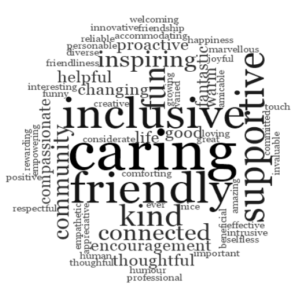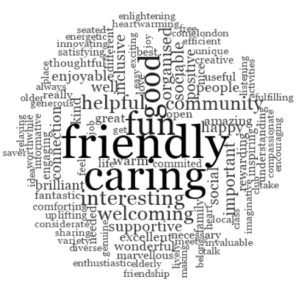Please note: this post is 80 months old and The Cares Family is no longer operational. This post is shared for information only
After eighteen months of study by our long term social research partners Renaisi, we are very pleased to present the findings of the third full evaluation of North London Cares' model and impact.
The study shows that as a result of being part of North London Cares and our sibling charity South London Cares, older and younger neighbours alike feel:

Our Love Your Neighbour programme is shown to:

Our Social Clubs programme is shown to:
Crucially, our Outreach is shown to reach those most at risk of loneliness.
The findings are important because they underscore the results of two previous evaluations: the first in 2014 which showed that North London Cares dramatically reduces neighbours' feelings of isolation and increases participants' activity in – and appreciation of – the changing world around them; and the second in 2016 which further showed that our model increases neighbours' wellbeing, happiness, and agency in and connection to their communities.
We are very proud of the results and grateful to all the funders, supporters, donors, partners and of course older and younger neighbours who are part of it.
But this study is also important because it recognises the limitations of traditional, top-down research methods of communities and community-led work – and trials new, inclusive ideas that push the boundaries of what makes good evaluation. In seeking to recognise people's rich lived experiences, their stories and their whole selves, rather than an aggregation of answers to questions which can feel abstract, the study:
While we are conscious, therefore, that the 483 older and younger neighbours who took part in this evaluation represents a relatively small sample from a scientific standpoint alone, we are also conscious that the richness in this evaluation – just like the richness in people's lives – comes as much from the deep dive into their experience of being part of North London Cares, and their broader experiences, as it does from the statistics alone.
The four main publications that make up the evaluation are below. We will also be sharing on social media some of the stories, quotes and diary entries from the older and younger people who tell us that they feel increased connection and community through being part of our model.
And over the coming weeks and months, we'll be working with partners to take our embedded evaluation approach, which we feel has the potential to improve impact evaluation across the community sector, even further.
We are very grateful to Esmee Fairbairn Foundation, Nesta, the University of Central Lancashire's Centre for Citizenship and Community and especially to Renaisi for their work inspiring, guiding, challenging, supporting and delivering this evaluation.